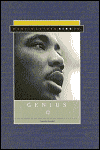Through the Looking Glass Children's Book Reviews
Genius: Martin Luther King Jr.
Nonfiction Series
For ages 10 to 14
The Creative Company, 2005 ISBN: 978-1583413296
The son of a teacher and a pastor, Martin Luther King Jr. did not have to suffer many of the hardships that his father had had to endure. He had a comfortable home, plenty to eat, and he was able to get an education. But there was something that he did not have, something which no black person in the south had at that time. Martin did not have the same rights as white people. He lived in a society that was segregated and he had to accept that he was a lesser citizen who could not play where he wanted, who could not eat in the restaurant of his choice, and who could not sit at the front of the bus. He, like the millions of other black people living in the south, was a victim of segregation.
As he grew up Martin came to understand how cruel and unjust segregation was and he wanted to do what he could to bring it to an end. He worked hard to get a good education and he, like his father before him, became a pastor. Like his father too Martin knew in his heart that his people would never be able to give of their best if they were forced down by laws which kept them separate and decidedly unequal. So Martin set about working to get the laws repealed and in the end he gave his life for the struggle.
With wonderful period photographs, quotes, and a timeline at the bottom of the pages, this biography of Martin Luther King Jr. captures the essence of who Martin was and what he fought to do in his lifetime. Superbly written with poignancy and an obvious appreciation for the history of the times, this is a book which will help readers understand what made Martin Luther King Jr. such a world icon.
At the back of the book there is a “In His Words” section. Here readers will find the texts for two of Martin Luther King Jr.’s famous speeches: the one he gave in a high school in 1967, and the one he gave when he was presented with the Nobel Peach Prize in 1964.




